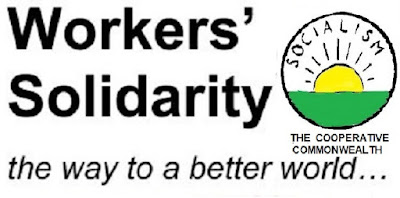Let us face the facts. Capitalism is strong, and the capitalists are growing wealthier. Even if American capitalism is fated to lose its place in the front rank, does that signify a collapse of capitalism? If China ousts America is the system itself any weaker? If European businesses become dependents on the investments of the Chinese billionaires is it any less necessary for the workers to overthrow capitalism? The transfer of the supremacy from Europe to America and now to China may well be a cause of strength to the capitalist system; it is certainly not any evidence of any systemic collapse. A particular country’s capitalists might suffer financial pain but capitalism itself is not undermined.
The confidence of the capitalists in the stability of capitalism rests on the docility of the working class. Capitalism continues because the workers unthinkingly accept it. Capitalism will end when the workers organise to bring it to an end. To educate and organise the workers for that purpose is the only problem with which socialists should concern themselves. Economic independence for the worker depends upon their free access to the land, factories, workshops, machinery, etc., and all other means of production.
The Socialist Party does not propose putting capital into the hands of the State, but that the producers should own the means of wealth production in common, and with the abolition of private or class ownership the State would die out. The State is not at the back of the capitalists. The State is the central committee of the capitalist class and carries on the executive affairs on their own behalf. All private property society needs a State to rule the subject class and to conduct and regulate the affairs of government in the interest of the ruling class.
Rent, interest and profit are three parts into which the surplus taken by the industrial capitalist is divided. These three forms result from private ownership and can only be abolished when the producers own the means of production. Rent, interest and profit are not the fundamental causes of poverty, but these three forms of stolen wealth are effects of capitalist ownership of the means of production. Modern methods of producing involve large-scale production and associated labour, the means of wealth cannot be owned individually by each worker. They are too vast and beyond the means of any producer. As they must be co-operatively worked, so they must be commonly owned. There is no other solution. Individual ownership by the few rich non-producers, with the resulting poverty of the many—or common ownership by the producers themselves for their own comfort and enjoyment. That is the position our critic has to face. We do not expect our masters to point out the cause of our poverty; their privileges as landlords, shareholders, and dummy directors are based upon our exploitation as producers. Obviously, then, it must be the workers’ task to convert those material means of providing comfort and security for others into the common property of all.
The Socialist Party holds that the people ought to own and control its own industries, that all things that are jointly needed and used ought to be jointly owned, that the basis of our social life, instead of being the private property of a few and operated for their enrichment, ought to be the common property of all, democratically administered in the interest of all.
We propose, in brief, that all resources, all land and buildings, all manufacturing establishments, mines, means of transportation and communication, should be, not private property, but the common property of all. We propose that production be made to serve the needs of those who work, rather than to serve the needs of a few parasites. We hold with science that production and distribution of goods can be planned to avoid anything resembling the crises in capitalist society, a planned economy on the basis of common ownership without any class divide. Experience has proved that planning under capitalism is impossible.
When we speak of a society organised on the basis of planned production and distribution what we have in mind is very simple. Do away with production for profit. Make a survey of all available resources, plant and personnel. Figure out how much of the products of each industry can be produced, say, in a year. Fix the annual consumption of the population at this rate. When you do so you are sure that nobody will go hungry or without a roof over his head. But this is not sufficient. Our purpose to increase production and to utilise the best services of scientists to improve our technology and methods of work to advance science for the purpose of improving life, not only to industry and agriculture but to all realms of life. The output of industry is sure to increase. Distribute the fruits of increased production among all the members of society. Improve their well-being. Increase production still more by further improving machinery and methods according to the latest data of science. Distribute the benefits of the increased production again among the population without exception, always heightening the technique of production to enrich the economic and cultural life of all the members of society and to ease their labour. Continue this process indefinitely. When you do so there will be no crises, no unemployment, no exploitation, no wars, no fear of the future. Everybody responsible for the welfare of all.
You have nothing to lose, but everything to win. Join together under the red flag of socialism and go bravely and energetically forward, the future belong to you, on this you can be sure. This is the way and the means to the big goal. Let no one forget to walk it.










